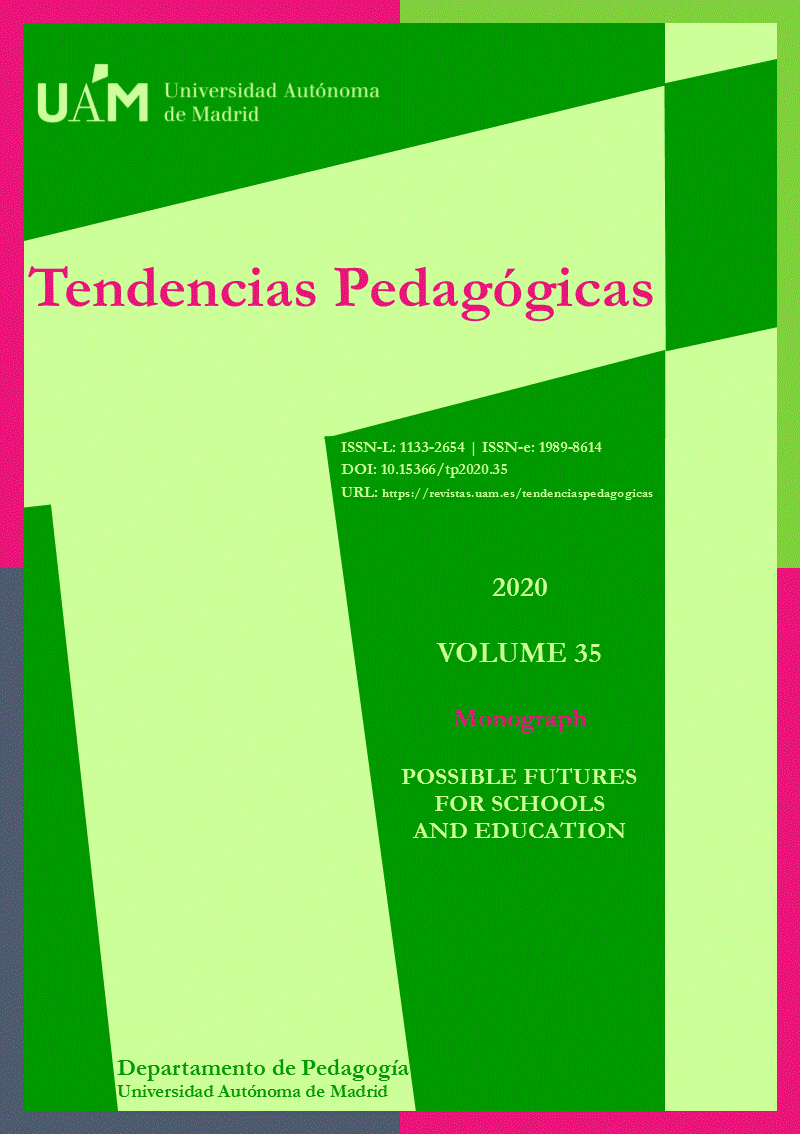Keywords:
Blockchain, certification, accreditation, ed-tech, smart contractsCopyright (c) 2020 Tendencias Pedagógicas

This work is licensed under a Creative Commons Attribution-NonCommercial 4.0 International License.
Abstract
Blockchain breaks into the educational scenario offering alternatives for improvement over certain administrative processes, such as recognition of user identity, non-mediated validation of academic certificates, or the use of smart contracts, among other novelties. Futuristic chronicles predict a transformation of the architecture of the educational system as a whole and an unprecedented synergy between teachers, institutions and formal and non-formal areas of education. Although the advances are in their infancy and there isn’t much academic research on the subject yet, it is clear that Blockchain has great potential with regards to its administrative application. Some educational initiatives based on the model of multilateral technological platforms result to be interesting as well as challenging. It is necessary to warn, however, about the little contribution that the application of Blockchain technology entails in the pedagogical dimension, and about the uncertainty that hangs over the revolutionary claims of the most extreme prospects, which predict more transformative power than what the technology itself seems to offer.Downloads
References
Arzuaga, G. (2018). Criptomonedas, Madrid: Conecta. Penguin Random House.
Bartolomé, A. R., Bellver, C., Castañeda, L., Adell, J. (2017). «Blockchain en educación: introduc-ción y crítica al estado de la cuestión». EDUTEC, Revista Electrónica de Tecnología Educativa, 61. Recuperado el 14 de mayo de 2018 de: http://www.edutec.es/revista/index.php/edutec-e/article/view/915. doi: doi.org/10.21556/edutec.2017.61.915.
Burbules, N. (2009). “Meanings of ubiquitous learning”. In Cope, B. & Kalantzis, M. (eds.); Ubiq-uitous Learning. Urbana II: University of Illinois Press, pp. 15-20.
Casey, M. & Vigna, P. (2018), “In Blockchain we trust”. MIT Technology Review, May/Jun 2018 Issue. Recuperado el 10 de abril de 2019 de https://www.technologyreview.com/s/610781/in-blockchain-we-trust/.
Chen, G., Xu, B., Lu, M. & Chen, M. S. (2018). “Exploring Blockchain technology and its poten-tial applications for education”. Smart Learning Environments, December 2018, 5: 1. doi: doi.org/10.1186/s40561-017-0050-x.
Clark, D. (2016). “10 ways Blockchain could be used in education”. OEB Insights. Recuperado el 23 de diciembre de 2017 de https://oeb.global/oeb-insights/10-ways-blockchain-could-be-used-in-education/.
Franceschin, T. (2017), «Los Bootcamps: una modalidad de aprendizaje en crecimiento». Edu4me. Recuperado el 15 de febrero de 2017 de http://edu4.me/los-bootcamps-una-modalidad-de-aprendizaje-en-crecimiento/.
Grech, A. & Camillery, A. (2017), “Blockchain in education”. JRC Science for Policy Report , Luxem-bourg: Publications Office of the European Union, 132 S. Recuperado el 26 de marzo de 2018 de http://publications.jrc.ec.europa.eu/repostory/bitstream/JRC108255/jrc108255_blockchain_in_education(1).pdf.
King, K., Prince, K & Swanson, J. (2016), “Learning on the Block: Could Smart Transactional Models Help Power Personalized Learning?”. KnowledgeWorks Forecast 4.0. Recuperado el 2 de mayo de 2017 de https://knowledgeworks.org/resources/blockchain-smart-transactional-models-2/.
Narodowski, M. y Botta, M (2017); «La mayor disrupción posible en la historia de la pedagogía moderna: Ivan Illich». Pedagogía y saberes. Buenos Aires: Universidad Pedagógica Nacional, Núm. 46; pp.45-54. doi: doi.org/10.17227/01212494.46pys45.54.
Oakeshott, M. (2000). «El racionalismo en política». En El racionalismo en la política y otros ensayos. México, FCE, 21-53.
Rosic, A. (2017), “Proof of Work vs Proof of Stake: Basic Mining Guide”. Blockgeeks. Recuperado el 14 de abril de 2018 de https://blockgeeks.com/guides/proof-of-work-vs-proof-of-stake/.
Rosic, A. (2018), “Decentralization has become Synonymous with Blockchain. But is it the truth?”. Blockgeeks. Recuperado el 14 de abril de 2018 de https://blockgeeks.com/decentralization-has-become-synonymous-with-blockchain-but-is-it-the-truth/.
Schmidt, P. (2017), “Credentials, Reputation, and the Blockchain”, EducauseReview. Recuperado el 14 de abril de 2018 de https://er.educause.edu/articles/2017/4/credentials-reputation-and-the-blockchain.
Tutellus. Bienvenido a la educación del futuro. White Paper. Julio 2018, ver. 3.27. Recuperado el 17 de abril de 2018 de https://lib.tutellus.com/ico/pdf/tutellus.io_whitepaper_v4.0_en.pdf.
Vander Ark, T. (2017), “How Blockchain Will Transform Credentialing (and Education)”, Getting Smart, December 21, Recuperado el 24 de abril de 2018 de http://www.gettingsmart.com/2017/12/blockchain-will-transform-credentialing-education/.
Vander Ark, T. (2018a), “Imagining A Blockchain University”, Forbes, Jun 13. Recuperado el 14 de abril de 2018 de https://www.forbes.com/sites/tomvanderark/2018/06/13/woolf-building-the-first-blockchain-university/#1daa50b05ae5.
Vander Ark, T. (2018b), “20 ways Blockchain Will Transform (Okay, May Improve) Education”, Forbes, Aug. 20. Recuperado el 14 de abril de 2018 de https://www.forbes.com/sites/tomvanderark/2018/08/20/26-ways-blockchain-will-transform-ok-may-improve-education/#70a11684ac91.
Watters, A. (2016). “The ideology of the Blockchain (for Education). HackEducation, April 14th, 2016. Recuperado el 24 de abril de 2018 de http://hackeducation.com/2016/04/14/blockchain-ideology.
Woolf University (2018), White Paper. Building the First Blockchain University, Aug. 2018. Recuperado el 28 de diciembre de 2018 de https://woolf.university/assets/doc/whitepaper.pdf.

